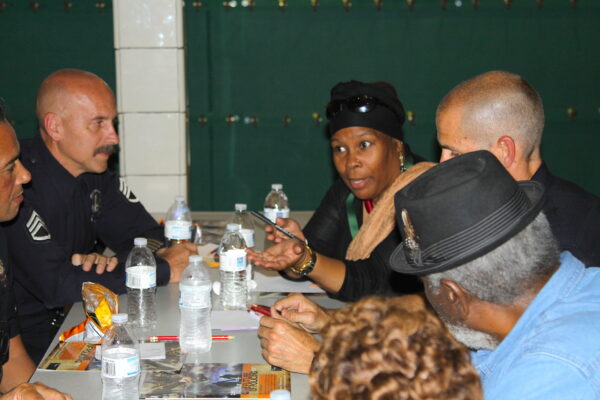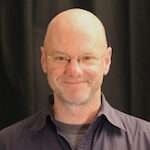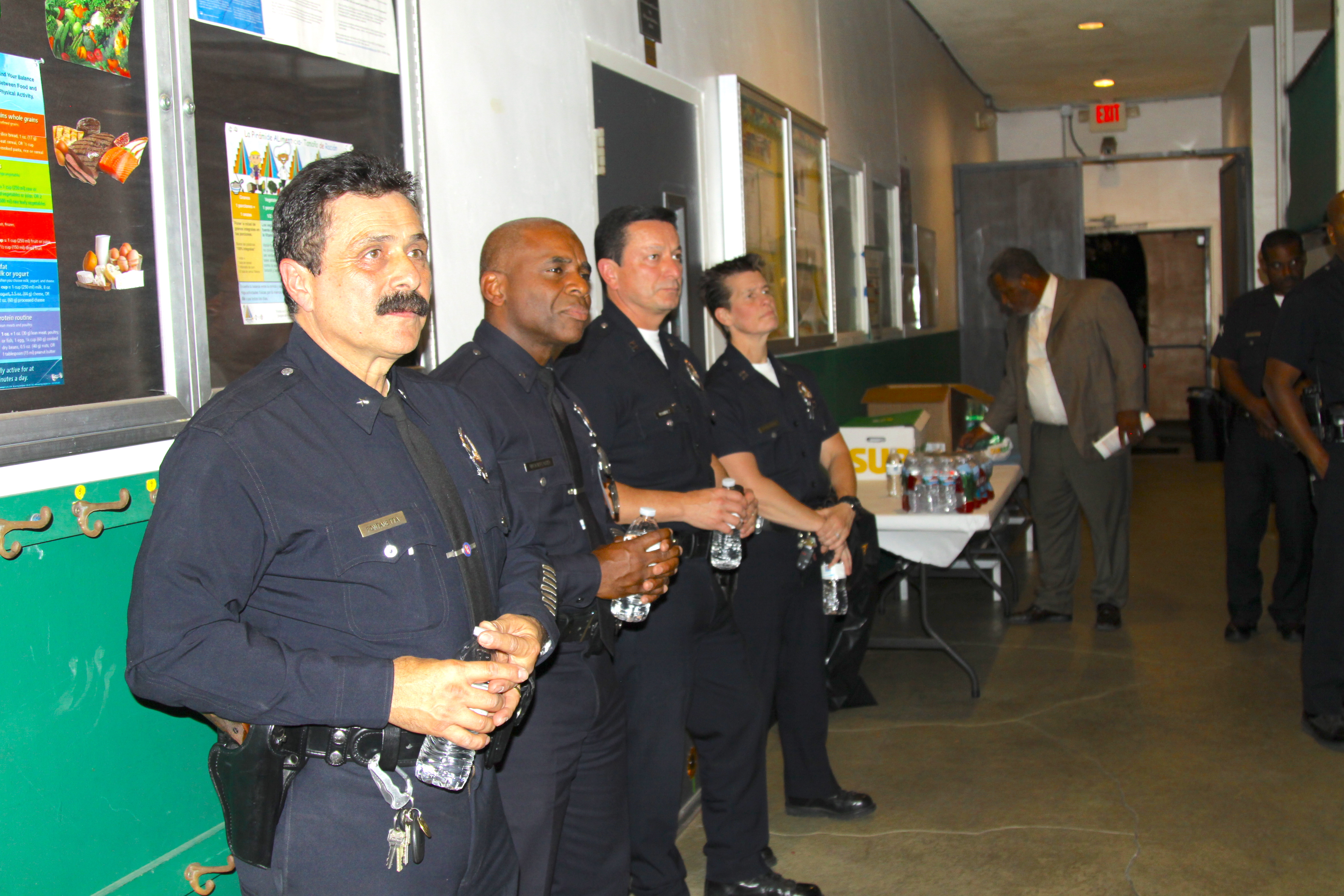This article originally appeared in BOOM California.
“We don’t want to walk into a kumbaya situation,” said Umar Hakim. The sixteen men and women gathered around a conference table in Inglewood simultaneously nodded in agreement. “We need training,” Hakim said, “because we already know who’s holding the power.”
One of the men at the table was Khalid Shah, a veteran activist and organizer in South L.A.’s African-American Muslim community.
“I wanted to be a police officer at one point,” Shah said as people began recounting stories about encounters with the LAPD. “Then the police killed my friend in the projects.”
He shook his head and his eyes clouded over as he relived the preventable event.
“Why?” he wondered, his pain a bridge between past and present.
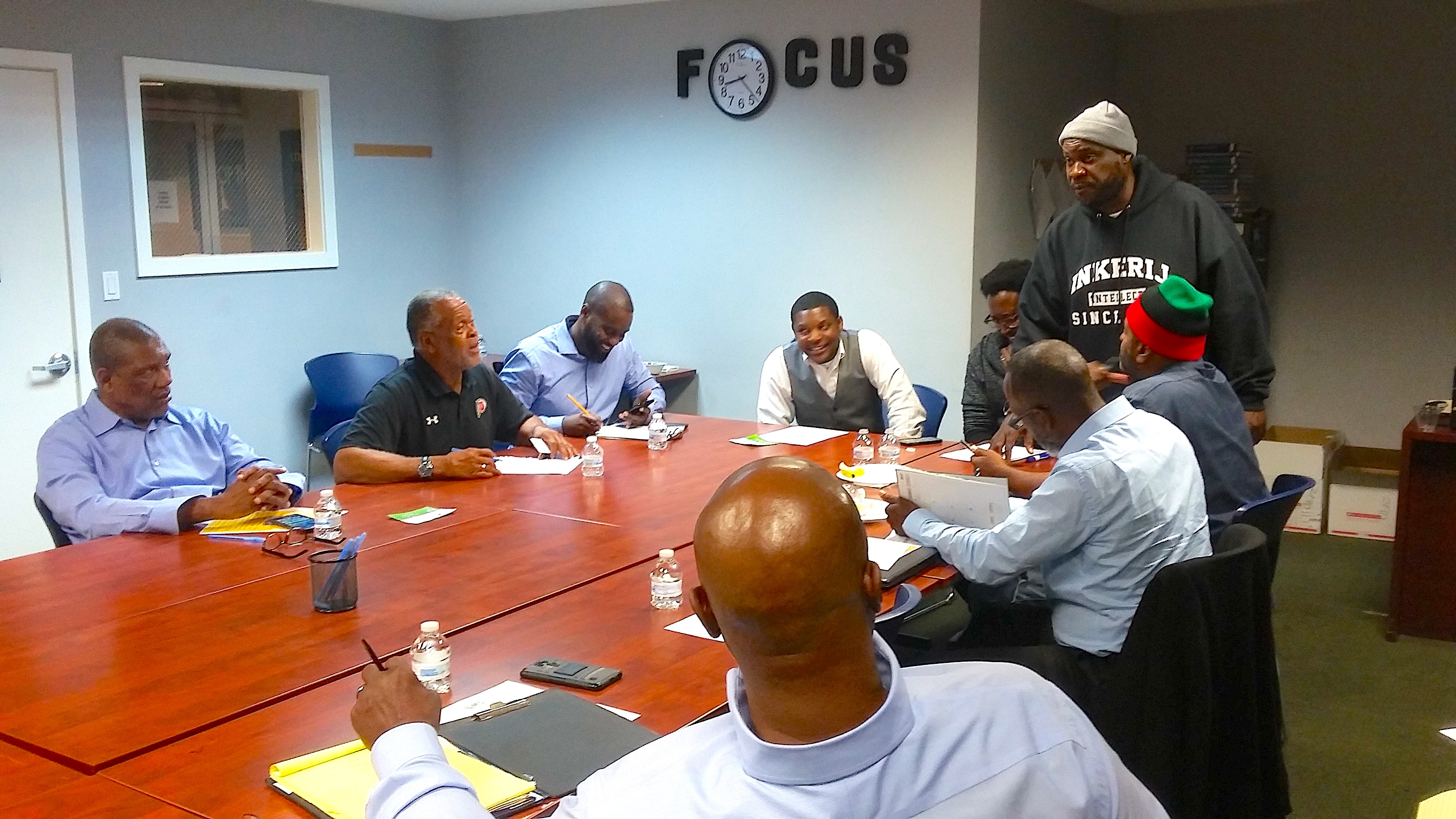 The community-development organization that Umar Hakim leads—Intellect, Love and Mercy (ILM) Foundation—convened the group to prepare for an upcoming public forum between African-American Muslims and the LAPD at Masjid Bilal Islamic Center in South Central. The meeting would be the first of its kind in recent memory between local law enforcement officers and the constituencies that Hakim and Shah represent.[1]
The community-development organization that Umar Hakim leads—Intellect, Love and Mercy (ILM) Foundation—convened the group to prepare for an upcoming public forum between African-American Muslims and the LAPD at Masjid Bilal Islamic Center in South Central. The meeting would be the first of its kind in recent memory between local law enforcement officers and the constituencies that Hakim and Shah represent.[1]
At a time when public officials often view both Muslims and African-Americans solely through the lenses of policing and security, the event at Masjid Bilal presented an opportunity for L.A.’s African-American Muslims to challenge and dispute that narrow perspective on their lives. It was also a chance for the community to exert agency over the way that law enforcement officers approach their work in neighborhoods where tensions between residents and the LAPD continue to run high and unresolved.
“I’ve heard so many stories of kids being dehumanized by police,” Khalid Shah stated, eliciting murmurs of recognition from everyone around the table. Shah added that his decades-long history of activism has paradoxically both reinforced and softened his suspicion of the LAPD.[2]
“I’ve also meet good, honest individuals who happen to be wearing the uniform,” he said. “That’s enabled me to balance things. I’ve even invited police to talk to some of the young people we work with.”
At that point Delonte Gholston stepped in to guide the conversation. Gholston and his co-facilitator, Eddie Anderson, were fresh from their work on the Trust Talks, a series of dialogues between residents of Skid Row and the LAPD. Umar Hakim had invited Gholston and Anderson to the meeting in Inglewood to help Hakim’s team prepare to steer the event at Masjid Bilal toward practical outcomes and away from both unproductive rancor and “kumbaya”—a feel-good form of dialogue that avoids hard truths and thus fails to move the conversation forward.[3]
“The name of the game is stories to solutions,” Gholston emphatically declared. “That means knowing your story, knowing what you want and knowing where you want to go with it.”
Anderson jumped in, lean and dapper in contrast to Gholston’s broad-shouldered casualness.
“If they hear our stories,” Anderson added, “they have to see our pain. Teach them how you want to be treated—show the problem and the solution in the same story.”
With that said, Delonte wrote the words “story” and “solution” at the top of two columns on a whiteboard at the head of the table.
“Now stories,” he said to the group. “What are your experiences with the police?”

Trauma weaved through the narratives that followed like an electrified wire. Abdul Ali, a barber who grew up in Watts, recalled the National Guard occupying his high school in the 1960s. Gerald Thompson, who came of age in South L.A. in the 1970s and 80s, recounted being hassled and even thrown against the side of a car by the police “just because I was hanging out.” Rashida Rogers, a sign-language interpreter, said she had intervened on several occasions when she witnessed LAPD officers “running up on” young people in her neighborhood.
Rogers said, “I have gotten out of my car and said, ‘What’s going on?’” when she observed police intimidating children who were on their way to school.
“The officer was like, ‘They were loud, they were making noise’,” Rogers said. “Holding up children from school because they were being loud! To me, they’re placing fear in them—the same oppressive mentality that they’ve always tried to instill in our young people.”
Gholston’s roster of words and phrases under the “story” heading painted a grim picture that depicted pure trauma, fear, deficient accountability, lack of trust, prejudice, and a preceding command-and-control culture. Stepping to the side of the whiteboard where he had written “solutions,” he asked, “How do we address this?”
“True community policing will only happen when police live in the community,” Eddie Anderson said. “We want officers who live within a five-mile radius of the communities where they work.”
Sadiq Davis, whose reentry story is depicted in the documentary “The Honest Struggle,” remarked, “If officers are friendly, it has a positive effect.” He added, “Some of them are just as afraid as we are.”
Others spoke about the importance of regular psychological evaluations for officers—especially those who have served overseas in the military—as well as the need for greater civilian oversight of the police department. In response to the latter point, Gholston mentioned Measure LL in Oakland, an initiative to create a civilian-run police commission and invest subpoena power in an agency responsible for investigating complaints of police misconduct. The measure won overwhelming support from voters when it appeared on local ballots in 2016, and Gholston believed it could be a model for similar initiatives in L.A.
“We also have to change our culture,” Khalid Shah interjected. “It’s cool to go to the penitentiary but not cool to become law enforcement officers. We have to become part of the effort to change that.”
Several people around the table looked dubious. Shah shrugged, conceding the complexity of the point.
“I fear the cop; I don’t respect him,” he said, playing Devil’s advocate against his own assertion. “Why would I want to become something I don’t respect?”
As the prep session wrapped up, participants took cellphone pictures of the stories and solutions that Gholston had written on the whiteboard. Umar Hakim hung back as everyone said their goodbyes.
“A lot of the men and women in the room had some deep history,” he said. “A lot of the new organizers make the elders feel like they’re obsolete. I want to build on where they left off.”
Hakim was also looking toward the upcoming meeting with the LAPD as a turning point.
“During the course of CVE”—shorthand for law enforcement initiatives that fall under the heading of countering violent extremism—“a lot of misconceptions are presented about the Muslim community, and particularly the African-American Muslim community,” Hakim said. “I have to use these relationships for more than saying you’re wrong. This is an opportunity to push back on those ideas.”
***
A couple of weeks later, on a warm Wednesday evening, the courtyard of Masjid Bilal—the seminal African-American mosque in Los Angeles[4]—was abuzz with conversation. About a hundred people were divided among ten tables. At each table there were two or three LAPD officers, a volunteer mediator from Days of Dialogue (an organization that facilitates challenging discussions between constituencies in Los Angeles) and about half a dozen members from Masjid Bilal and other predominantly African-American Muslim congregations. Participants from the prep session in Inglewood were thrown in the mix as well.
Andrea Martinez Gonzalez, a mediator from the city’s Department of Consumer and Business Affairs, ended up at a table where a woman from Sub-Saharan Africa was an unexpected ally for a young white LAPD officer who looked defensive and uncomfortable.
“The African woman created an interesting dynamic at our table,” Gonzalez said. “She was coming from a law-and-order culture that had respect for the police. She was really on the officer’s side!”
Gonzalez said that the other people at the table were polite, but kept bringing up the problems related to police violence that were plaguing their neighborhoods, as well as other communities across the country. In telling his story, the officer said people regularly shouted at him and disrespected him while he was trying to do his job—and that he was frustrated because nothing he tried seemed to diffuse those situations.
“That might change with more of these dialogues,” Gonzalez said later. “There are bad apples in every profession. But a lot of why people are angry is that these young officers are the inheritors of what went on in the old days.”[5]
She added that the officer also complained that news outlets only produce stories about what law enforcement officers do wrong. Still, she was sympathetic to the counter-narrative offered by the community members at her table.
“It’s incredible how much injustice is out there,” she said. “People feel the police are there for anything but protection.”[6]
Gonzalez said that she was optimistic about the prospects for further meetings between the groups represented that night at Masjid Bilal.
“I’m impressed from the first dialogue that this group is really trying to build a bridge to the LAPD,” she said. “The more dialogues they have, the better it is. It’s noble work.”
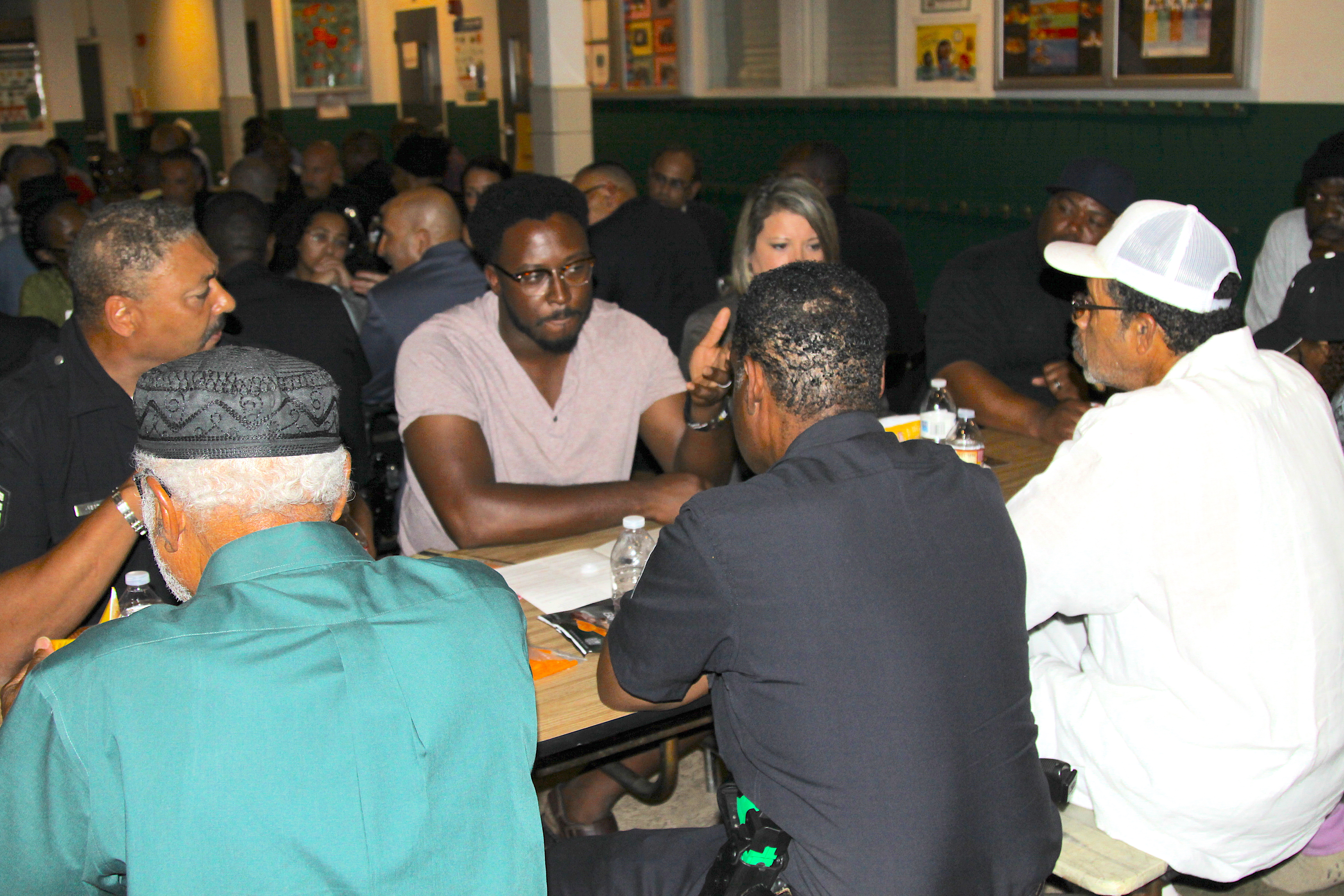 Officer Jim Buck, a community liaison with the LAPD’s Counter-terrorism and Special Operations Bureau who sat at a different table, echoed Gonzalez’s cautious optimism. He also knew the sources of tension in the room, along with the possibilities for progress, as well as anyone else.
Officer Jim Buck, a community liaison with the LAPD’s Counter-terrorism and Special Operations Bureau who sat at a different table, echoed Gonzalez’s cautious optimism. He also knew the sources of tension in the room, along with the possibilities for progress, as well as anyone else.
“It’s been a real journey with Umar,” Buck said. “The first time I met him, he didn’t want to have much to do with me. Since then, he and I have had many conversations about policing. We’ve agreed to disagree on many issues, but I consider him a very close friend.”
A decade ago, Buck was serving as a drill instructor at the Los Angeles Police Academy when the then-Chief of Police asked him to become a liaison between the LAPD and communities like Masjid Bilal. The assignment was in some ways an odd fit—Buck described himself as a “conservative Republican.” But his gregarious personality turned out to be the most important asset in his effort to allay fears and build trust among people who were wary of his intentions as a representative of a police counter-terrorism bureau.
“When the community has issues,” Buck said, “they come to us. We’re the most visible form of government. My unit has to understand how Islam expresses itself in Los Angeles. People have invited my unit into their homes, mosques, businesses and schools.”
Referring to the event at Masjid Bilal, he said, “All of this is what we do, how we do it, why we do it. We want to create a resilient community.”
Like Gonzalez, Buck said he saw the event as the first step on a long but hopeful road.
“It gives us a positive starting point,” he said. “But the easy part is getting communities together. The challenge is moving forward.”
Rashida Rogers, the sign-language interpreter who attended the prep session in Inglewood, was mostly pleased with her experience at Masjid Bilal. From her perspective, the key benefit was the opportunity for members of the community to present their story in their own words and to lay the groundwork for future events that could move the conversation in a positive, evolutionary direction.
“Sometimes the story gets twisted,” she said. “This was my first time speaking up and saying that the information you have about us portrayed us wrong. What I heard in response to that at my table makes me hopeful.”
She said it was the officers’ apparent willingness not just to hear, but to really accept what she was saying that left her optimistic.
“If people can change the condition of their hearts,” she concluded, “who am I to think that change can’t happen?”
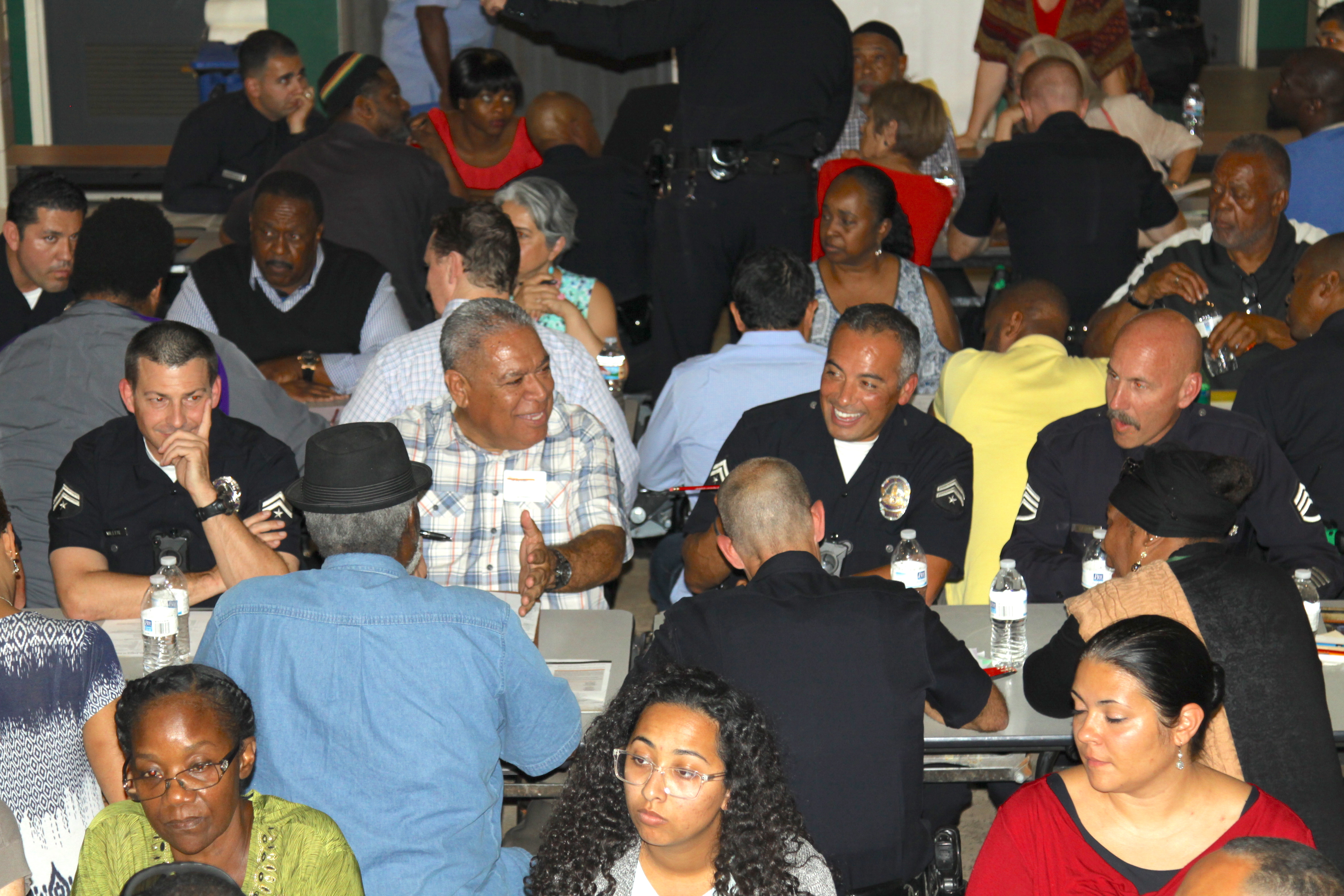
A few weeks after the meeting at Masjid Bilal, Umar Hakim was savoring success.
“People feel like an opening was made,” he said. “It broke a lot of ice in our own community and showed us that we can address our problems in a diplomatic way when people are trained and given the tools to promote accountability.”
The key to that positive outcome was the storytelling strategy that the prep session participants brought to the tables where they sat during the event.
“It was good to work out the kinks in talking about your trauma behind closed doors,” Hakim said. “Then when you get to the public square, you say what you need to say. People felt like they were actually heard. That’s what I really wanted—to help my community to establish its voice.”
Hakim said he envisions future dialogues between the LAPD and the city’s Muslim communities—achieving concrete changes like the police reforms enacted through Measure LL will take sustained effort. He also wants to see meetings between community leaders and the developers who are driving gentrification in South Los Angeles, particularly around the site of Inglewood’s new football stadium.
“We’ve trained around twenty leaders at this point,” Hakim remarked, referring to community accountability programs developed through the Intellect, Love and Mercy Foundation. “I would like to get to forty, sixty, one hundred. We need a platoon of people to address development! Enhancing the community is cool, but I want to be sure our people don’t get left behind in the process of progress.”
Whether it’s confronting tensions between citizens and police or managing development in a community where residents have historically been denied agency over their lives, Hakim is optimistic that the strategy that yielded signs of progress at Masjid Bilal can be replicated as a means of tackling other challenges.
“Out of this I hope people will see that there’s more than one way to approach a problem,” he said. “You’ve got to engage it from all angles.”
Notes
[1] The Pew Research Center’s first-ever national survey of American Muslims (“Muslim Americans: Middle Class and Mostly Mainstream”), conducted in 2007, found that African-Americans account for roughly twenty percent of the total Muslim population in the U.S.
[2] Andrew J. Grandage, Britt S. Aliperti, and Brian N. Williams refer to this historical overlay of past practice that distorts police-citizen collaboration in the present as a “shadow effect.” See Grandage et al., “Leveraging the Intersection of Politics, Problem, and Policy in Organizational Change: An Historical Analysis of the Detroit, Los Angeles, and Atlanta Police Departments,” in James D. Ward, ed., Policing and Race in America: Economic, Political, and Social Dynamics (Lanham, MD: Lexington Books, 2018), 57.
[3] Dialogue is generally acknowledged as the key process involved in successful conflict resolution—specifically, as a prerequisite for de-essentializing the “other” and building trust between conflicting groups. See, for example, Ivana Markova and Alex Gillespie, eds., Trust and Conflict: Representation, Culture and Dialogue (New York: Routledge, 2011) and Daniel Yankelovich, The Magic of Dialogue: Transforming Conflict into Cooperation(New York: Simon and Schuster, 2001).
[4] Yvonne Yazbeck Haddad and Jane I. Smith, eds., Muslim Communities in North America (Albany: State University of New York Press, 1994), 166.
[5] Following the Rodney King beating in 1991 and the riots that followed the acquittal of the officers involved in the incident a year later, Mayor Tom Bradley formed the Christopher Commission to conduct a comprehensive assessment of the LAPD’s operations. Among other findings, the commission determined that nearly two hundred officers were implicated in repeated instances of excessive use of force. A few years later, officers in the elite Community Resources Against Street Hoodlums (CRASH) program figured prominently in the Rampart Division violence and corruption scandal. After a 12-year period of reform mandated by the U.S. Department of Justice, the LAPD was finally freed from federal oversight in 2013. See Grandage et al., “Leveraging the Intersection of Politics, Problem, and Policy in Organizational Change,” 71.
[6] According to the Pew Research Center’s 2017 Demographic Portrait of Muslim Americans, “American-born black Muslims are more likely than other U.S. Muslims to say it has become harder in recent years to be Muslim in the United States. Nearly all American-born black Muslims (96%) say there is a lot of discrimination against Muslims in America, almost identical to the share who say there is a lot of discrimination against black people in the U.S. (94%).”
Nick Street was a senior writer with the USC Center for Religion and Civic Culture.
